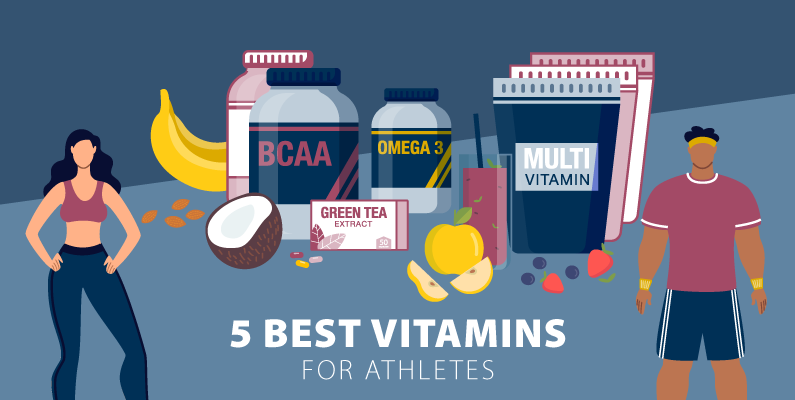The Best Vitamins for Athletes
| 4 Min Read

This blog post was written by guest contributor, Maggie Michalczyk, RDN.
It’s no surprise that athletes need proper nourishment to fuel up and feel good for optimal performance, sustainable activity, and injury prevention. That’s why it’s important for active people to focus on getting key nutrients from foods to help fuel their lifestyle.
A well-balanced diet should target the best vitamins for athletes and their necessary daily values. However, it’s important to be proactive about incorporating foods that contain them in the diet.
Certain vitamins (and minerals) are especially important for energy metabolism, the formation of red blood cells, and combating oxidative stress. In most cases these vitamins are very easy to obtain through common foods most people eat daily like bananas, chicken, and sweet potatoes.
Vegan and vegetarian athletes need to be especially proactive and aware of their vitamin status as some of these crucial nutrients for energy production and more are found in meat, poultry, and dairy.
Whether you’re going for a trail run or clocking miles on your bike, feel your best by fueling up with foods that supply the body with optimal nutrition that is important for active individuals.
The Best Vitamins for Athletes
Vitamin B12
B12 is a crucial vitamin for energy metabolism. Every cell in the body depends on vitamin B12, as it plays a part in the synthesis of fatty acids and energy production, making it a crucial vitamin for athletic performance. A deficiency can result in weakness, fatigue, and even numbness in the extremities.
Since this vitamin is primarily found in animal products, vegan and vegetarian athletes are at risk for becoming deficient. For strict vegans and vegetarians, it’s important to incorporate breads, cereals, and other grains that have been fortified with B12 or take a daily supplement.
Food sources of vitamin B12: fish, meat, poultry, eggs, milk
Vitamin A
Well known for its role in vision health, vitamin A is also a potent antioxidant that helps to fight free radicals caused by oxidative stress and has been shown to play a role in bone health. Excess amounts from supplements can have toxic effects, so check with a health care provider before taking.
Food sources of vitamin A: sweet potato, spinach, pumpkin, carrots, broccoli
Vitamin D
Known as the “sunshine vitamin” because it’s produced in your skin when you absorb sunlight, vitamin D regulates the absorption of calcium and phosphorus — two minerals crucial for healthy bones. Vitamin D deficiency can put athletes at risk for stress fractures, muscle pain, and weakness.
Food sources of vitamin D: cheese, egg yolks, canned salmon, mushrooms
Vitamin B6
Vitamin B6 is responsible for protein and glucose metabolism, and the manufacture of hemoglobin in the body. B6, along with the other B vitamins, is responsible for the way the body unlocks the energy in food to use it for energy and cellular health, which is especially important for people who are very active.
Just like with the other B vitamins, B6 is a water-soluble vitamin, meaning it’s excreted through urine and not stored in the body. Foods that contain B vitamins must be consumed daily.
Food sources of B6: chickpeas, banana, avocado, sweet potato, eggs, tuna, salmon
Iron
Iron is a mineral, but it’s definitely worth talking about in the context of nutrition for athletes because it’s responsible for oxygen transportation throughout the body, especially to working muscles.
Not enough iron in the body may cause fatigue and impact physical performance on a variety of different levels. Iron is lost through sweat, skin, urine, the GI tract, and menstruation. Female athletes are at a higher risk for iron deficiency and may require supplementation.
Foods that contain iron: red meat, lentils, beans, tofu, spinach, pumpkin seeds
Why Do Athletes Need Vitamins?
From energy metabolism and production to bone health, the best vitamins for athletes span functions that even the most casual athletes can’t ignore. By avoiding deficiencies and fueling the body, an appropriate diet can provide the necessary minerals and vitamins for athletic performance.
Enhance your understanding of nutrition and athletic performance with a master’s in exercise science online. Become a leader in the industry with this 100% online program from Concordia University, St. Paul. When you graduate, you can pursue entry or advancement as a sports nutritionist, occupational therapist, athletic trainer, coach, exercise physiologist, and more.
You can also take a look at our sports nutrition playbook for trainers guide to learn more about boosting athletic performance.
Maggie Michalczyk is a registered dietician in Chicago, Illinois. You can follow her on her blog and Instagram @onceuponapumpkin